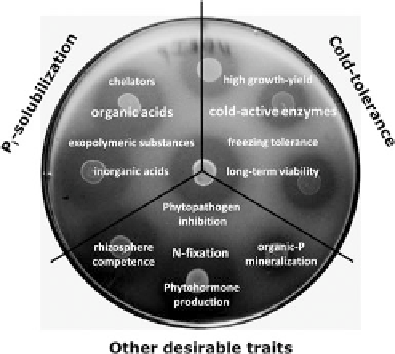Agriculture Reference
In-Depth Information
Fig. 5.2
Most prominent
traits to look for when
searching for proficient
CT-PSB
example,
Burkholderia vietnamiensis
M6 has been found to tolerate several envi-
ronmental stressing factors simultaneously, including high salt concentrations
(up to 3 % KCl and 5 % NaCl) as well as low and high pHs (range 2-11 pH
units), still solubilizing P
i
rapidly (Park et al.
2010
). On the other side, both
Rahnella
sp. BIHB 783 and
Acinetobacter rhizosphaerae
BIHB 723 exhibited
similar broad-spectrum plant growth-promoting abilities (i.e., both could enhance
the growth of four different crops) and high rhizospheric competence, without a
significant effect on the resident microbial population (Vyas et al.
2010
; Gulati
et al.
2009
,
2010
). The latter attribute has been considered very important in the
screening of new isolates for the development of plant growth-promoting formula-
tions (Lottmann et al.
2000
; Castro-Sowinski et al.
2007
). It has to be mentioned,
however, that plant growth promotion experiments with
Rahnella
sp. and
A. rhizosphaerae
were carried out at normal temperatures (25
C).
Among the CT-PSB,
Exiguobacterium
strains are emerging as very promising
candidates to develop efficient inoculants for mountainous regions.
Exiguobacterium
strains have been isolated from an impressive diversity of
extreme environments, including the Siberian permafrost, a glacial ice core sample
in Greenland, and hot springs in Yellowstone National Park (Vishnivetskaya
et al.
2009
). Selvakumar et al. (
2009b
) reported the isolation of a strain identified
as
E. acetilycum
1P (MTCC 8707) from the rhizosphere of apple trees (
Malus
domestica
) growing at 2,200 m.a.s.l. in Uttarakhand state, in the N.W. IHR. Strain
1P was able to grow from 4 to 42
C (optimal growth temperature 30
C) and to
tolerate a wide pH range (4-10 pH units) and also high salt concentrations (up to
8 % NaCl). Besides producing indoleacetic acid (IAA), hydrogen cyanide (HCN),
and siderophores at 4
C, the strain retained its P-solubilizing ability at this
suboptimal temperature. More importantly, the PGP ability of
E. acetylicum
1P
was confirmed using wheat as test crop under non-sterile soil conditions at cold
temperatures (18
C) (Selvakumar et al.
2010
). Indeed, a significant increase in root
and shoot biomass was observed in bacterized seedlings. Additionally, increased

